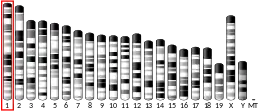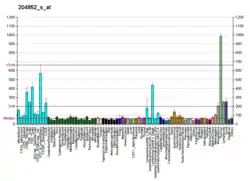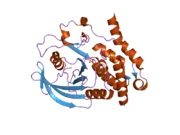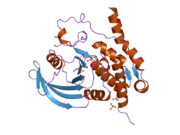PTPN7
Protein tyrosine phosphatase non-receptor type 7 is an enzyme that in humans is encoded by the PTPN7 gene.[5][6]
| PTPN7 | |||||||||||||||||||||||||||||||||||||||||||||||||||
|---|---|---|---|---|---|---|---|---|---|---|---|---|---|---|---|---|---|---|---|---|---|---|---|---|---|---|---|---|---|---|---|---|---|---|---|---|---|---|---|---|---|---|---|---|---|---|---|---|---|---|---|
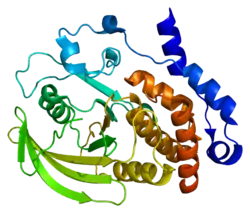 | |||||||||||||||||||||||||||||||||||||||||||||||||||
| |||||||||||||||||||||||||||||||||||||||||||||||||||
| Identifiers | |||||||||||||||||||||||||||||||||||||||||||||||||||
| Aliases | PTPN7, BPTP-4, HEPTP, LC-PTP, LPTP, PTPNI, protein tyrosine phosphatase, non-receptor type 7, protein tyrosine phosphatase non-receptor type 7 | ||||||||||||||||||||||||||||||||||||||||||||||||||
| External IDs | OMIM: 176889 MGI: 2156893 HomoloGene: 15411 GeneCards: PTPN7 | ||||||||||||||||||||||||||||||||||||||||||||||||||
| |||||||||||||||||||||||||||||||||||||||||||||||||||
| |||||||||||||||||||||||||||||||||||||||||||||||||||
| |||||||||||||||||||||||||||||||||||||||||||||||||||
| |||||||||||||||||||||||||||||||||||||||||||||||||||
| |||||||||||||||||||||||||||||||||||||||||||||||||||
| Wikidata | |||||||||||||||||||||||||||||||||||||||||||||||||||
| |||||||||||||||||||||||||||||||||||||||||||||||||||
Function
The protein encoded by this gene is a member of the protein tyrosine phosphatase (PTP) family. PTPs are known to be signaling molecules that regulate a variety of cellular processes including cell growth, differentiation, mitotic cycle, and oncogenic transformation. This gene is preferentially expressed in a variety of hematopoietic cells, and is an early response gene in lymphokine stimulated cells. The noncatalytic N-terminus of this PTP can interact with MAP kinases and suppress the MAP kinase activities. This PTP was shown to be involved in the regulation of T cell antigen receptor (TCR) signaling, which was thought to function through dephosphorylating the molecules related to MAP kinase pathway. Two alternatively spliced transcript variants encoding different isoforms have been found for this gene.[6]
References
- GRCh38: Ensembl release 89: ENSG00000143851 - Ensembl, May 2017
- GRCm38: Ensembl release 89: ENSMUSG00000031506 - Ensembl, May 2017
- "Human PubMed Reference:". National Center for Biotechnology Information, U.S. National Library of Medicine.
- "Mouse PubMed Reference:". National Center for Biotechnology Information, U.S. National Library of Medicine.
- Adachi M, Sekiya M, Isobe M, Kumura Y, Ogita Z, Hinoda Y, Imai K, Yachi A (September 1992). "Molecular cloning and chromosomal mapping of a human protein-tyrosine phosphatase LC-PTP". Biochem Biophys Res Commun. 186 (3): 1607–15. doi:10.1016/S0006-291X(05)81592-X. PMID 1510684.
- "Entrez Gene: PTPN7 protein tyrosine phosphatase, non-receptor type 7".
- Pettiford SM, Herbst R (February 2000). "The MAP-kinase ERK2 is a specific substrate of the protein tyrosine phosphatase HePTP". Oncogene. 19 (7): 858–69. doi:10.1038/sj.onc.1203408. PMID 10702794.
- Saxena M, Williams S, Taskén K, Mustelin T (September 1999). "Crosstalk between cAMP-dependent kinase and MAP kinase through a protein tyrosine phosphatase". Nat. Cell Biol. 1 (5): 305–11. doi:10.1038/13024. PMID 10559944. S2CID 40413956.
- Saxena M, Williams S, Brockdorff J, Gilman J, Mustelin T (April 1999). "Inhibition of T cell signaling by mitogen-activated protein kinase-targeted hematopoietic tyrosine phosphatase (HePTP)". J. Biol. Chem. 274 (17): 11693–700. doi:10.1074/jbc.274.17.11693. PMID 10206983.
Further reading
- Adachi M, Sekiya M, Arimura Y, Takekawa M, Itoh F, Hinoda Y, Imai K, Yachi A (1992). "Protein-tyrosine phosphatase expression in pre-B cell NALM-6". Cancer Res. 52 (3): 737–40. PMID 1370651.
- Zanke B, Suzuki H, Kishihara K, Mizzen L, Minden M, Pawson A, Mak TW (1992). "Cloning and expression of an inducible lymphoid-specific, protein tyrosine phosphatase (HePTPase)". Eur. J. Immunol. 22 (1): 235–9. doi:10.1002/eji.1830220134. PMID 1530918. S2CID 29146172.
- Swieter M, Berenstein EH, Swaim WD, Siraganian RP (1995). "Aggregation of IgE receptors in rat basophilic leukemia 2H3 cells induces tyrosine phosphorylation of the cytosolic protein-tyrosine phosphatase HePTP". J. Biol. Chem. 270 (37): 21902–6. doi:10.1074/jbc.270.37.21902. PMID 7545170.
- Maruyama K, Sugano S (1994). "Oligo-capping: a simple method to replace the cap structure of eukaryotic mRNAs with oligoribonucleotides". Gene. 138 (1–2): 171–4. doi:10.1016/0378-1119(94)90802-8. PMID 8125298.
- Zanke B, Squire J, Griesser H, Henry M, Suzuki H, Patterson B, Minden M, Mak TW (1994). "A hematopoietic protein tyrosine phosphatase (HePTP) gene that is amplified and overexpressed in myeloid malignancies maps to chromosome 1q32.1". Leukemia. 8 (2): 236–44. PMID 8309248.
- Suzuki Y, Yoshitomo-Nakagawa K, Maruyama K, Suyama A, Sugano S (1997). "Construction and characterization of a full length-enriched and a 5'-end-enriched cDNA library". Gene. 200 (1–2): 149–56. doi:10.1016/S0378-1119(97)00411-3. PMID 9373149.
- Saxena M, Williams S, Gilman J, Mustelin T (1998). "Negative regulation of T cell antigen receptor signal transduction by hematopoietic tyrosine phosphatase (HePTP)". J. Biol. Chem. 273 (25): 15340–4. doi:10.1074/jbc.273.25.15340. PMID 9624114.
- Saxena M, Williams S, Brockdorff J, Gilman J, Mustelin T (1999). "Inhibition of T cell signaling by mitogen-activated protein kinase-targeted hematopoietic tyrosine phosphatase (HePTP)". J. Biol. Chem. 274 (17): 11693–700. doi:10.1074/jbc.274.17.11693. PMID 10206983.
- Oh-hora M, Ogata M, Mori Y, Adachi M, Imai K, Kosugi A, Hamaoka T (1999). "Direct suppression of TCR-mediated activation of extracellular signal-regulated kinase by leukocyte protein tyrosine phosphatase, a tyrosine-specific phosphatase". J. Immunol. 163 (3): 1282–8. PMID 10415025.
- Saxena M, Williams S, Taskén K, Mustelin T (1999). "Crosstalk between cAMP-dependent kinase and MAP kinase through a protein tyrosine phosphatase". Nat. Cell Biol. 1 (5): 305–11. doi:10.1038/13024. PMID 10559944. S2CID 40413956.
- Pettiford SM, Herbst R (2000). "The MAP-kinase ERK2 is a specific substrate of the protein tyrosine phosphatase HePTP". Oncogene. 19 (7): 858–69. doi:10.1038/sj.onc.1203408. PMID 10702794.
- Gjörloff-Wingren A, Saxena M, Han S, Wang X, Alonso A, Renedo M, Oh P, Williams S, Schnitzer J, Mustelin T (2000). "Subcellular localization of intracellular protein tyrosine phosphatases in T cells". Eur. J. Immunol. 30 (8): 2412–21. doi:10.1002/1521-4141(2000)30:8<2412::AID-IMMU2412>3.0.CO;2-J. PMID 10940933. S2CID 8132613.
- Tartaglia M, Mehler EL, Goldberg R, Zampino G, Brunner HG, Kremer H, van der Burgt I, Crosby AH, Ion A, Jeffery S, Kalidas K, Patton MA, Kucherlapati RS, Gelb BD (2001). "Mutations in PTPN11, encoding the protein tyrosine phosphatase SHP-2, cause Noonan syndrome". Nat. Genet. 29 (4): 465–8. doi:10.1038/ng772. PMID 11704759. S2CID 14627986.
- Wang ZX, Zhou B, Wang QM, Zhang ZY (2002). "A kinetic approach for the study of protein phosphatase-catalyzed regulation of protein kinase activity". Biochemistry. 41 (24): 7849–57. doi:10.1021/bi025776m. PMID 12056917.
- Digilio MC, Conti E, Sarkozy A, Mingarelli R, Dottorini T, Marino B, Pizzuti A, Dallapiccola B (2002). "Grouping of Multiple-Lentigines/LEOPARD and Noonan Syndromes on the PTPN11 Gene". Am. J. Hum. Genet. 71 (2): 389–94. doi:10.1086/341528. PMC 379170. PMID 12058348.
- Kosaki K, Suzuki T, Muroya K, Hasegawa T, Sato S, Matsuo N, Kosaki R, Nagai T, Hasegawa Y, Ogata T (2002). "PTPN11 (protein-tyrosine phosphatase, nonreceptor-type 11) mutations in seven Japanese patients with Noonan syndrome". J. Clin. Endocrinol. Metab. 87 (8): 3529–33. doi:10.1210/jcem.87.8.8694. PMID 12161469.
- Pettiford SM, Herbst R (2003). "The protein tyrosine phosphatase HePTP regulates nuclear translocation of ERK2 and can modulate megakaryocytic differentiation of K562 cells". Leukemia. 17 (2): 366–78. doi:10.1038/sj.leu.2402767. PMID 12592337.


